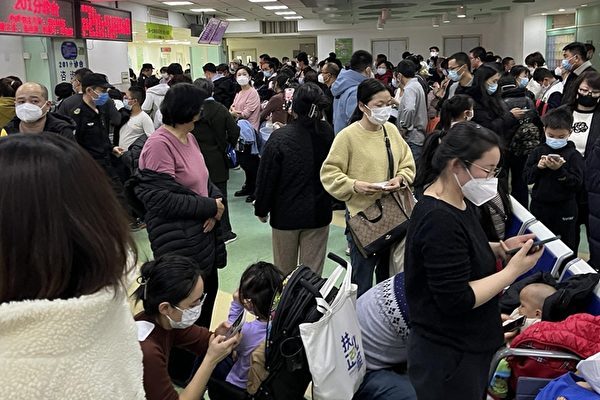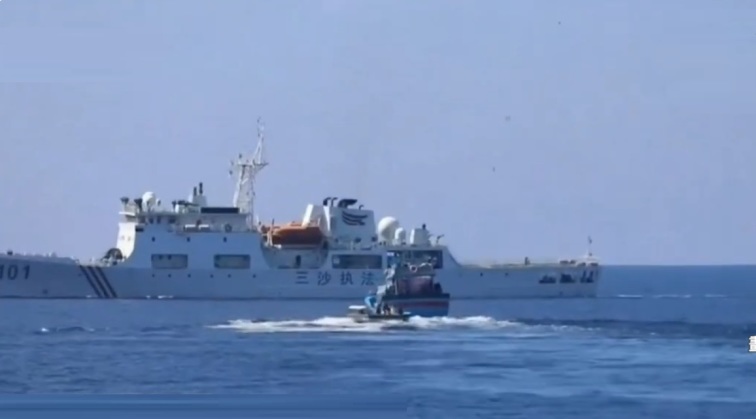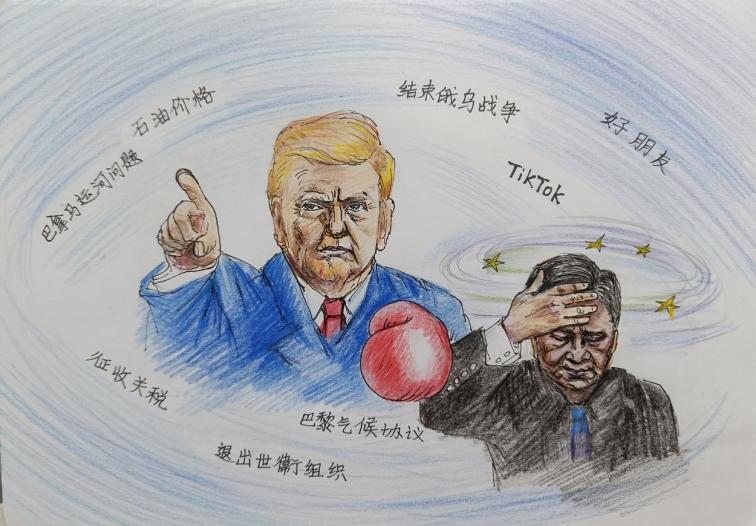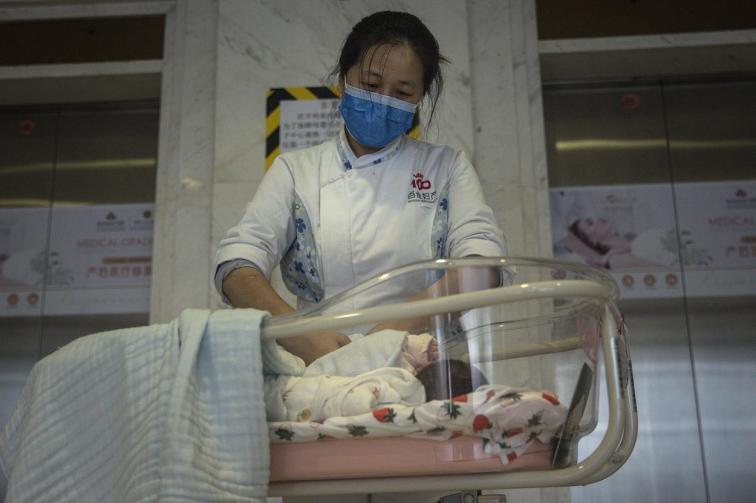The Chinese Communist Party (CCP) is aggressively expanding its military, with its nuclear arsenal expected to reach 1,500 warheads by 2035, approaching the scale of the U.S. and Russia. The United States is increasingly concerned about China's nuclear expansion. (Video screenshot)
People News - Corruption is deeply entrenched within the Chinese Communist Party (CCP), extending even to its critical nuclear military-industrial enterprises, where multiple cases of corruption and intelligence leaks have surfaced. Military experts warn that corruption in these enterprises could indirectly impact China's nuclear weapons development.
According to Djiyuan, two state-owned enterprises (SOEs) involved in nuclear military research—the China Academy of Engineering Physics (CAEP) and China National Nuclear Corporation (CNNC)—have recently undergone leadership reshuffles, which are suspected to be linked to corruption investigations.
China’s State Council recently announced several personnel appointments, including: Huang Ming and Chen Jun as Vice Presidents of CAEP; Tang Li as Chairman of the Science and Technology Commission at CAEP.
The China Academy of Engineering Physics is one of China’s key military-industrial SOEs and its primary nuclear weapons research institution. However, it has not escaped Beijing’s recent large-scale purges within the military-industrial system.
On July 5, 2023, CAEP President Liu Cangli (62) and Vice President Mo Zeyao (53) were both suddenly removed from their positions without any official explanation. Their whereabouts remain unknown. The new CAEP President, He Yingbo, was previously the Deputy Secretary of the Party Committee at the institute. Given the CCP’s recent pattern, such sudden dismissals without clear reasons or further assignments are often interpreted as signs of serious disciplinary or criminal investigations.
Between December 2023 and January 2024, Zhang Kejian, who served as Vice Minister of Industry and Information Technology and Director of the National Defense Science, Technology, and Industry Administration, was removed from both positions amid speculation that he was under investigation. Zhang had previously served as the Party Secretary of CAEP, linking him to China’s nuclear weapons development program.
CAEP, which is responsible for developing China’s nuclear arsenal, has already been implicated in corruption cases in previous years.
On April 22, 2019, Deng Quannong, former Director of the Applied Technology Research and Development Center at the China Academy of Engineering Physics (CAEP) and former Chairman of Sichuan Jiuyuan Investment Holding Group, was placed under investigation. Deng was accused of: Illegally holding and trading stocks for profit; Using his position for personal gain in project development, restructuring, funding allocations, and contract bidding; Soliciting bribes; Engaging in long-term sexual misconduct.
China’s nuclear arsenal expansion has drawn global attention in recent years. In June 2023, the Stockholm International Peace Research Institute (SIPRI) reported that: China’s nuclear warhead stockpile grew from 410 warheads in January 2023 to 500 warheads in January 2024; 24 warheads were placed on high-readiness operational status for the first time. Some analysts believe China’s actual nuclear stockpile may be even larger than estimated.
However, Su Tzu-yun, Director of the Institute for National Defense and Security Research in Taiwan, told Dajiyuan that corruption in China’s military-industrial sector could indirectly impact its nuclear weapons program, particularly in two ways: Exaggerated budget reports leading to embezzlement; Substandard materials and poor construction quality.
Since 2023, China’s Rocket Force has been plagued by corruption investigations, involving: Li Shangfu, former State Councilor and Minister of National Defense; Three consecutive Rocket Force commanders: Li Yuchao, Zhou Yanning, and Wei Fenghe.
Over the past two years, foreign media have exposed multiple corruption cases in China’s defense sector, including in nuclear weapons development.
In early 2024, Bloomberg cited U.S. intelligence sources, revealing shocking corruption within China’s defense industry: Some ballistic missiles were found to contain water instead of fuel; Many missile silo doors in western China were defective and could not open properly, rendering them useless in wartime.
In September 2024, several U.S. media outlets, citing Pentagon sources, reported that a newly built Chinese nuclear-powered attack submarine sank in the Wuhan waters earlier that spring. However, Beijing has covered up the incident.
In October 2024, the former Chief Engineer of the Rocket Force Research Institute, Xiao Longxu, was stripped of his membership in the Chinese People’s Political Consultative Conference (CPPCC). Lyle Morris, a researcher at the Asia Society Policy Institute, told Radio Free Asia that the large-scale purge of senior executives responsible for weapons development in China’s state-owned enterprises indicates serious financial mismanagement in two of Xi Jinping’s top military priorities: aircraft carriers and nuclear weapons.
Has the nuclear military-industrial giant China National Nuclear Corporation (CNNC) also "run into trouble"?
During the 2024 Chinese New Year, Yu Jianfeng, Chairman of China National Nuclear Corporation (CNNC), along with several other top executives in the military-industrial sector, were notably absent from public "greetings" activities. Earlier, on January 17, Yu also failed to attend CNNC’s internal anti-corruption meeting. Observers speculate that he may already be under investigation.
Public records show that CNNC is one of China’s largest state-owned enterprises (SOEs) involved in nuclear weapons, nuclear power, nuclear fuel, and nuclear technology applications.
Historically, CNNC has been involved in major intelligence leaks. In October 2010, Kang Rixin, former General Manager of CNNC, was removed from office and expelled from the Chinese Communist Party (CCP) for: Illicit dealings in nuclear industry project bidding; Embezzling public funds for stock speculation, resulting in huge losses. Later, he was sentenced to life in prison. Kang had once held high-ranking political positions, including membership in the Central Committee of the CCP and the Central Commission for Discipline Inspection.
However, Major General Jin Yinan, a professor at China’s National Defense University, later revealed in a speech that Kang’s case involved espionage. According to Jin: Kang sold China’s nuclear intelligence to foreign countries; After his arrest, Beijing was highly alarmed and ordered a full investigation; The case was officially labeled as an “economic crime” to avoid further embarrassment.
On April 28, 2019, just days after Deng Quannong, a former CAEP official, was removed from office, Peng Yuxing, then Vice Governor of Sichuan Province, was also dismissed.Reports suggest that Peng was under investigation for criminal offenses related to his jurisdiction.
Peng’s background: In 2015, he became Party Secretary of Mianyang, a key center for China’s military industry research and production; Simultaneously, he served as Secretary of the Party Working Committee of China (Mianyang) Science and Technology City; In September 2017, he was promoted to Vice Governor of Sichuan Province and Director of the Sichuan Provincial Office for Military-Civil Fusion.
According to Radio Free Asia, media sources in Sichuan suggest that: Peng had a special background in the military-industrial sector; He was suspected of leaking China’s nuclear weapons secrets to foreign intelligence agencies.










News magazine bootstrap themes!
I like this themes, fast loading and look profesional
Thank you Carlos!
You're welcome!
Please support me with give positive rating!
Yes Sure!